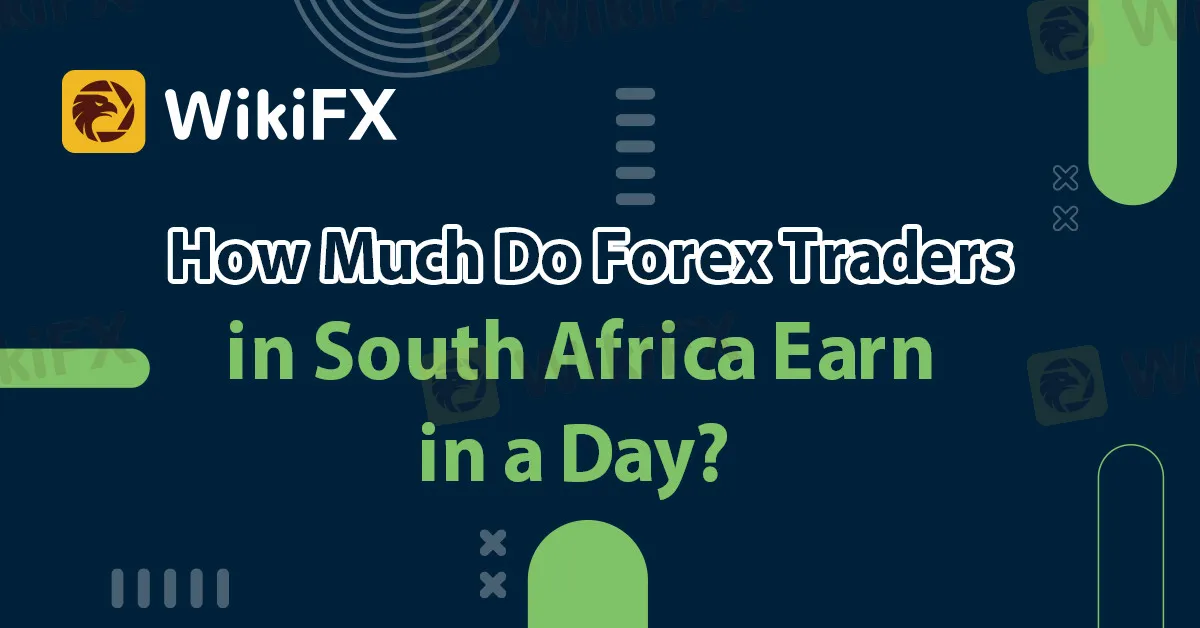简体中文
繁體中文
English
Pусский
日本語
ภาษาไทย
Tiếng Việt
Bahasa Indonesia
Español
हिन्दी
Filippiiniläinen
Français
Deutsch
Português
Türkçe
한국어
العربية
How Much Do Forex Traders in South Africa Earn in a Day?
Abstract:Is this even possible? Depending on the sort of trading you do, you could be wondering if Forex is the best option. What if the bulk of traders are unable to profit from the Forex market? How long will it take you to increase your profits? Is the profit stable, or does it fluctuate? These are issues that all traders, regardless of their position in the Forex sector, ponder

South Africa is a developing country that has implemented Forex trading effectively. However, a single trader's level of commitment may differ. Hard effort, dedication, and a lot of optimism go a long way toward achieving success. How much do Forex traders in South Africa earn every day?
The daily amount will be determined by the magnitude of the deal and its regularity. Traders that achieve a large profit are usually experienced. Unfortunately, people make tiny mistakes or lose a lot of money in the realm of online trading. The trader's lack of discipline typically results in greater losses than they could handle in the first place.
You must have a practical mindset:
It's possible. There are various requirements that must be met. To begin, do you have a realistic outlook? Are you devoting enough effort to improving your trading abilities? If you answered yes, excellent; if you answered no, you're probably wasting time and energy trying to develop a winning mindset. Inspiring stories have a great effect on the human psyche. Please do not, however, compare yourself to others.
Their risk tolerance is varied, as is their beginning money and amount of risk. So, how much do Forex traders in South Africa make every day to get you on board, train you, and give you the experience you need to grasp the benefits and risks?
A trader in South Africa makes an average of $50 each day. This is depending on the competence and plan of the trader. Furthermore, the volatility of assets on any given day, as well as the number of trades; simply put, a trader will make more if they invest more. A trader's losses in South Africa are likewise based on the aforementioned basis.
How much money do you need to get started?
It all depends on the size of the lots. The modest investment will result in reduced profit margins, regardless of how successful the trader is.
Risk management is another essential element. Smaller traders can still make money with their initial cash, but it will take some time, maybe a year.
Professional traders in South Africa make a lot of money, but their profits are inconsistent.
If you take one transaction every day, an average Forex trader in South Africa makes $ 200 each week.
Forex is not an easy career, nor is it a quick way for individuals to get wealthy. However, if you use the correct trading platform, you will increase with time.
Nobody knows how much money a Forex trader in South Africa makes in a day.
You can be confident that the market will alter in the current economic condition.

Disclaimer:
The views in this article only represent the author's personal views, and do not constitute investment advice on this platform. This platform does not guarantee the accuracy, completeness and timeliness of the information in the article, and will not be liable for any loss caused by the use of or reliance on the information in the article.
Related broker
Read more

Common Tactics Used in Online Trading Fraud Today
Know the top online trading scams of 2025, from fake apps to pump-and-dump tricks. Simple tips to spot and avoid them, keeping your money safe in this easy guide.

RM1.29 Million Lost in ‘C Baird VIP’ WhatsApp Scam
A 43-year-old company auditor and subcontractor in Malaysia became the latest victim of an elaborate investment scam after losing RM1.29 million to a fraudulent scheme promoted via WhatsApp.

U.S. March ISM Manufacturing PMI Released
The U.S. March ISM Manufacturing PMI data shows that manufacturing has contracted for the first time, and investors should pay attention to future changes and impacts on the sector.

Breaking News! Forex Inflows Surge to $17 Billion
Nigeria's foreign exchange inflows saw a significant increase in the fourth quarter of 2024, reaching $17.39 billion. This growth reflects strong foreign investments and export revenues, bringing new confidence to the market.
WikiFX Broker
Latest News
Exposing the Top 5 Scam Brokers of March 2025: A Closer Look by WikiFX
Gold Prices Climb Again – Have Investors Seized the Opportunity?
Webull Launches SMSF Investment Platform with Zero Fees
Australian Regulator Warns of Money Laundering and Fraud Risks in Crypto ATMs
FCA Warns Against 10 Unlicensed or Clone Firms
CySEC Warns Against 14 Unlicensed Investment Websites
Top Currency Pairs to Watch for Profit This Week - March 31, 2025
Will natural disasters have an impact on the forex market?
Philippines Deports 29 Indonesians Linked to Online Scam Syndicate in Manila
The Withdrawal Trap: How Scam Brokers Lure Victims into Paying More
Currency Calculator







